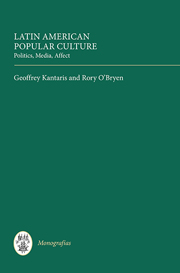Book contents
- Frontmatter
- Contents
- List of Illustrations
- Notes on Contributors
- Acknowledgements
- Introduction: The Fragile Contemporaneity of the Popular
- I Politics
- II Media
- III Affect
- 9 Affect, Politics and the Production of the People: Meditations on the Río Magdalena
- 10 The Politics of Emotion in the Mexican Revolution: The Tears of Pancho Villa
- 11 Memory and Affective Technologies in the Argentine Comic Book Series Cybersix
- Index
9 - Affect, Politics and the Production of the People: Meditations on the Río Magdalena
from III - Affect
Published online by Cambridge University Press: 05 October 2013
- Frontmatter
- Contents
- List of Illustrations
- Notes on Contributors
- Acknowledgements
- Introduction: The Fragile Contemporaneity of the Popular
- I Politics
- II Media
- III Affect
- 9 Affect, Politics and the Production of the People: Meditations on the Río Magdalena
- 10 The Politics of Emotion in the Mexican Revolution: The Tears of Pancho Villa
- 11 Memory and Affective Technologies in the Argentine Comic Book Series Cybersix
- Index
Summary
In this chapter I would like to reflect on the ways in which the Magdalena river has figured both in the imaginary production of a Colombian national-popular body, and in its dissolution, and at key moments in Colombian history from the mid-nineteenth century to the beginning of the twenty-first. I do so not to reclaim the river and its landscape, in a Romantic vein, as the wellspring of some authentic national ‘spirit’. Instead I am more interested in how instances of the articulation of such a thing occur in both real and imagined spaces where the nation's integrity is most questionable and the porosity of its borders most conspicuous.
As the principal route for the traffic of people, ideas and capital between colonial times and the early twentieth century, the Magdalena was for a long time central to the construction of the nation. Even today, as flows of global capital and information have displaced the organic motif of the river as an index of historical time and of the nation's temporal unfolding (see Appadurai 1996; Castells 2000), the Magdalena retains an affectively loaded presence in works of Colombian art and literature. Thus, in texts such as Fernando Vallejo's El río del tiempo (1998), where nature's collapse mirrors the entropy of Colombian public life, or films such as Bolívar soy yo (Jorge Alí Triana 2002), where history dissolves into the two dimensionality of the spectacle, the Magdalena continues to perform a labour of figuration, albeit of the nation's destiny as pipedream or curse.
- Type
- Chapter
- Information
- Latin American Popular CulturePolitics, Media, Affect, pp. 227 - 248Publisher: Boydell & BrewerPrint publication year: 2013



